
Oil prices jump on fears of Iranian retaliation against US
Oil prices are up sharply and major stock markets are falling after U.S. forces in Iraq killed a top Iranian general.
The price of oil surged 3.5% and major indexes were down 0.8% in early trading. The drops came after a bullish start to the New Year and a blockbuster gain in 2019.
The S&P 500 fell 25 points, or 0.8%, to 3,232. The Dow Jones Industrial Average lost 224 points, or 0.8%, to 28,640. The Nasdaq lost 77 points, or 0.9%, to 9,013. Bond prices rose.
News that Gen. Qassem Soleimani, head of Iran’s elite Quds Force, was killed in an air attack at the Baghdad international airport prompted expectations of Iranian retaliation.
During past flare-ups in relations with the U.S., Iran threatened the supply of oil that travels from the Persian Gulf to the rest of the world. About 20% of crude traded worldwide goes through the Strait of Hormuz, where the shipping lane is only 3 kilometres wide and tankers have come under attack this year.
The international benchmark for crude oil jumped 3.7%, or $2.45, to $68.70 a barrel in London trading. The U.S. contract was up 3.6%, or $2.18, to $63.36.
“Revenge will come, maybe not overnight, but it will come and until then we need to increase the geopolitical risk premium,” said Olivier Jakob, head of consultancy Petromatrix, in a note to investors.
He noted that Iran’s response may not be limited to the Strait of Hormuz.
In September, Yemen’s Iran-backed Houthi rebels launched drone attacks on the world’s largest oil processing facility in Saudi Arabia. The strike briefly took out about half of the supplies from the world’s largest oil exporter. The U.S. directly blamed Iran, which denied involvement.
Launching attacks that can’t be easily linked back to Iran limits the chances of direct retaliation.
However, Iran has also directly targeted tankers. This year it seized a British-flagged tanker, the Stena Impero, for several weeks. And it has shot down a U.S. military drone.
About 80% of the crude oil that travels through the Strait of Hormuz goes to countries in Asia, including China, Japan, India and South Korea.
Because the prices of fuels like gasoline generally reflect moves in the market for crude, that could mean higher costs for drivers and airlines, for example. Airline shares were down sharply across the world on Friday.
In the U.S., crude oil accounts for just over 50% of the price of gasoline, according to the U.S. Energy Information Administration.


